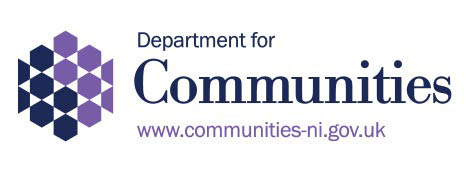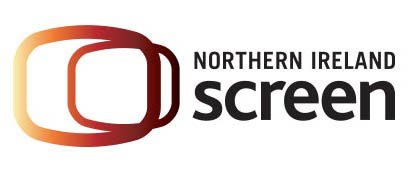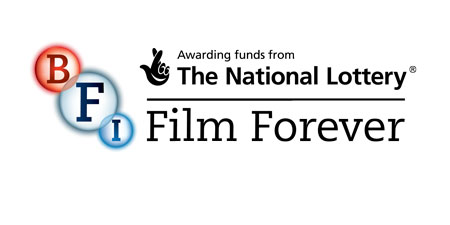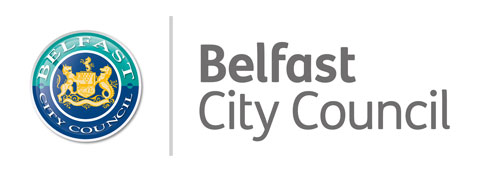LUMI at Iris Prize Film Festival
08 February 2024
Ever wondered what it's like to attend one of the best LGBTQ+ film festivals in the world? LUMI Programmer Katherine Harris shares her experience of attending the 2023 Iris Prize LGBTQ+ Festival.
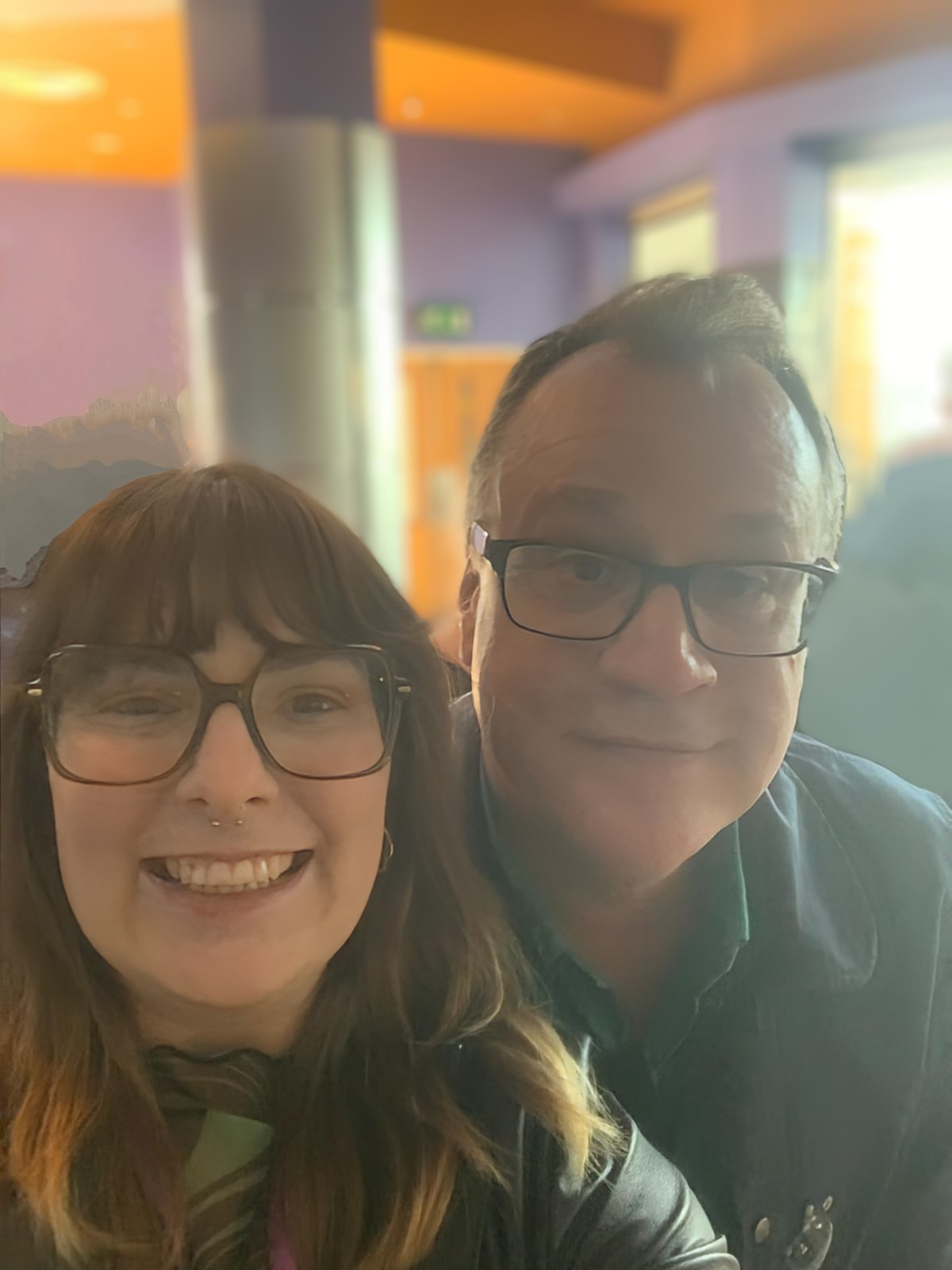
LUMI Programmer Katherine Harris with Russell T Davies at the Iris Festival.
As a LUMI programmer, I had the chance to find out when I travelled to Cardiff to join the 17th edition of the Iris Prize Festival. The festival showcases the best in queer filmmaking from around the world, with a massive selection of films, talks and this year the opportunity to see Russell T Davies, legendary writer and producer who revived Doctor Who and created some of the most iconic LGBTQ+ shows.
Iris was founded in 2007 by Berwyn Rowlands, who wanted to create a platform for LGBTQ+ stories and voices. Since then, it has grown to become one of the most respected LGBTQ+ film events and has attracted industry professionals, and audiences (like me) from across the globe. It’s so important as it provides a platform for films that show the richness and the resilience of the LGBTQ+ community. It challenges stereotypes and prejudices while fostering a sense of empowerment and pride among both LGBTQ+ people and allies.
As a first-time festival goer, I was nervous and excited to attend Iris. I had never travelled to Wales before, let alone to a major international film event. I was equipped with no expectations, no previous experience and a new glasses prescription and so was ready to immerse myself in the world of LGBTQ+ cinema, and in turn reflect on my own queerness.
My first film highlight is Ticker, one of the films I watched as part of the ‘Silver Heart’ category, highlighting the stories of older LGBT+ people, and it was a quick way to make me bawl. Ticker was a beautifully real portrayal of the earnestness of getting old with your partner and was a very refreshing take on an older gay couple. It was intimate, it welcomed you to not only experience a short car ride of theirs, but the echoes of life lived, the remembrance of songs danced and the hesitation of affection. It left the audience misty eyed as we all slowly digested this 9-minute snippet of love and tenderness.
This short film was an excellent way to highlight people that are often overlooked in the media. It reminded me of the LUMI Award winning film, Where do all the old gays go? - a documentary examining queer people that are living long quiet lives while also examining those that we need to respect and remember who paved the way.
Another film highlight was Queen of My Dreams, an incredible intergenerational perspective on women, culture and queerness. It explores the stories of Mariam, a Pakistani Muslim woman and her Canadian born daughter Azra and shows their struggle with each other's identities and their shared love of the Bollywood film Aradhana.
We initially follow Azra, studying for her MFA in acting and living with her girlfriend, then her journey back to Pakistan after the death of her father. It’s here their dynamics really come into play - the emotional distance formed between Azra and Mariam cannot be blamed on physical distance anymore. It’s an obvious shock for Azra, still reeling from the death of her father, she now has to contend with understanding her mother’s humanity also. The film then switches to follow Mariam's younger life, trying to carve out a future for herself in Pakistan while she deals with her own form of traditionalism, her journey in discovering her own partner and eventually her moving to Canada- the strained tension with her own mother creates an almost cyclic tale of distance.
It's a gem of a film, from the stylised cinematography of Pakistan's Golden Age to Amrit Kaur's incredible performance as both Azra and young Mariam, displaying such similarities that you end up screaming to the screen asking why they ever argued in the first place.
If you liked Everything, Everywhere, All At Once, and are a sucker for mother/daughter relationships that feel like both a gut punch and a therapy session, then like me you’ll come out of this film heartbroken and delighted.
During my time I was also able to attend the panel The Queer Archive, In and Out. Imagine Room 101, but the opposite, where people in industry each justify a queer film to be included in the archive forever. It was an amazing chance to share their experiences of queer films and in some cases how it led them to explore their careers. The panel included a great mix of celebration of queer films and education into the history of queer films.
The panel encouraged us to think of our own film for the archive. I chose But I’m a Cheerleader, a cliche I know but I feel like watching it is such a refreshing comedic break, the messiness of the plot contrasting with the neon pink of it all always makes for an easy pick-me-up rewatch.
Lastly, I want to talk about Gay Aliens and Queer Folk, a talk by Emily Garside based on her book of the same name and the experience that was meeting Russell T Davies.
Gay Aliens and Queer Folk was a brilliant intro to the impact Russel T Davies had on the industry. Garside talked about how Davies brought queer narratives to surface, from Queer as Folk being the first-time gay men were shown on screen as their own (sometimes flawed) characters, not as sidekicks or stereotypes, to the inherent queerness of Torchwood. She discussed how Davies’s consideration of different perspectives in the LGBTQ+ community allowed a ‘shared language’ and safe space and how this community gained was so valuable for queer people to have a place to discover themselves.
Russel T Davies himself was so exciting to see in person. He covered his opinions on writing and creating, starting with a workshop in determination- a guide to creators fully knowing and understanding their stories. Working from a small point up, making sure they’ve considered the smallest leaf before considering the tallest tree. From this the conversation moved into how to consider characters, how there is always ‘a bit of you’ in every character and how this should be embraced with the quote ‘You can't make anything beyond you’.
The session morphed into how to make sure this work is considered, how to walk into a room and ‘be loud with your idea’. He addressed all current filmmakers and empowered them to ‘have no hesitation in getting your film made’ and to create a pitch that is so foolproof they can't say no.
As everyone was leaving, I had the chance to say a few words of thanks to him. I'm a lifelong Doctor Who fan because of his revival of the show. He thanked me and we managed to get a quick selfie together.
Going to Iris was a challenge for me as I felt a lot of pressure to make the most of this opportunity. However, as the festival went on, I found myself more and more immersed in the films and the atmosphere of Cardiff. I was amazed by the diversity and quality of the films and I loved being able to talk about them with everyone. Although I will admit, nearer the end of the festival I sometimes forgot there were other people at the screenings, I was so absorbed by the stories.
The Iris Festival was such a memorable and rewarding experience for me, and I learned a lot about film and about my own experience as a queer person.

